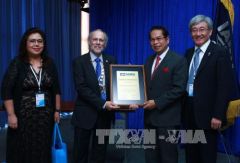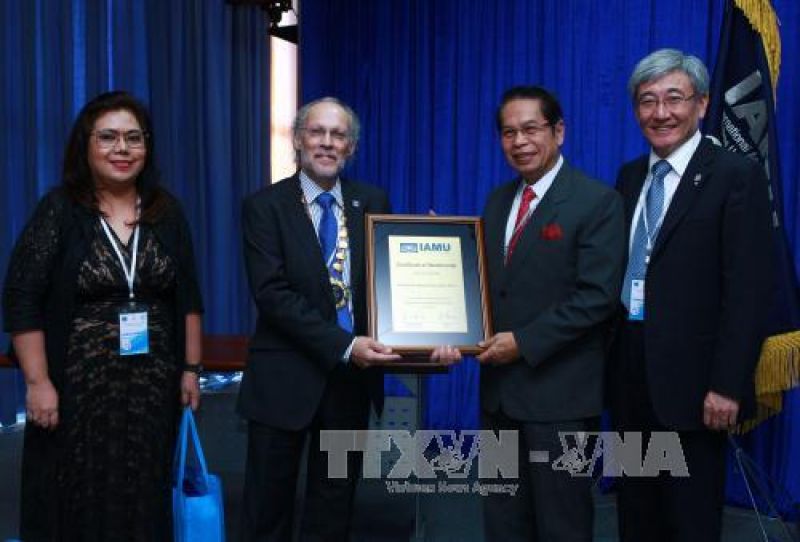Representatives from maritime universities around the world gathered in Vietnam last week at the annual congregation of the International Association of Maritime Universities (IAMU).
The Association held its Annual General Assembly, Board meetings, and Annual Conference in Hai Phong, Vietnam, where members met to progress maritime research, education, and training projects, and exchange ideas and best practice.
The Australian Maritime College’s Principal, Professor Neil Bose, is Chair of the International Executive Board and General Assembly. He was joined by Professor Athanasios Karlis, Dr Peggy Chen, Rumesh Merien-Paul, Philip Mackrill, and Dr Shantha Jayasinghe Arachchillage. Mrs Nicola Hodgman attended from the University of Tasmania.
A key IAMU objective is to create a well-educated, global maritime workforce and various projects are underway to help drive up standards across the world. The project working groups presented their progress in Hai Phong and decisions were made regarding continuation of the projects, as follows.
Future Curricula for Degrees for Seafaring Officers
Because ships of the future will be very different from those of today, one IAMU working group is investigating future curricula for degrees for seafaring officers - who will need to handle extremely large and sophisticated vessels, more and more complex cargo vessels, huge cruise vessels, vessels with high risk cargoes, and high speed craft.
Based on its work so far, the group made three recommendations, which were accepted by the General Assembly:
- Future model curricula should not be prescriptive, but be used as a guide for universities to adopt for their own needs.
- Degrees for seafaring officers should include educational outcomes well above and beyond the minimum requirements of the STCW in order to prepare future seafarers for a rapidly changing industry.
- Degrees for seafaring officers should also provide a preparation for those seafarers who wish to transition to shore-based careers beyond their service at sea.
On-Board Training
A further working group, investigating on-board training standards and best practice, presented the findings of a survey of approximately 700 students who have spent time training at sea.
The results show a sizeable minority of students reporting that on-board training could be improved. In response, the group has written a paper that will be presented to the International Maritime Organisation (IMO), with recommendations relating to how on-board training improvements could be addressed via international standards.
Peer-Assisted Self-Evaluation Scheme
The General Assembly approved the continuation of a peer-assisted, self-evaluation scheme in the Philippines. This project aims to improve seafarer education in the region and has carried out a number of successful workshops.
Performance Indicators for Maritime Universities
A pilot project, led by the University of Tasmania, is working to establish performance indicators for maritime universities. The pilot has been carried out with data provided by six universities, and performance indicators have been established in three areas: research, teaching and international. The results were presented to the General Assembly, who approved continuation of the project for a further year, with proposed voluntary participation being extended to all IAMU universities.
More information on IAMU is available on their website.
Published on: 10 Nov 2016

